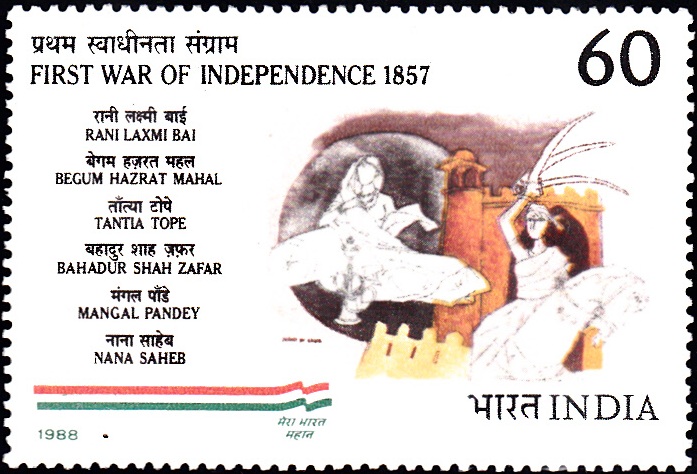
Indian First War of Independence 1857
A commemorative postage stamp on the Martyrs of the First War of Indian Independence (Sipahi Vidroh), 1857 Revolution :
 Issued by India
Issued by India
Issued on May 9, 1988
Issued for : The Department of Posts is happy to issue a stamp as a tribute to the memory of those who laid down their lives over 130 years ago.
Description of Designs : The stamp depicts M.F. Husain’s painting on Rani Lakshmi Bai, who was transformed from a queen leading a life of luxury to a warrior leading her armies into battle against injustice. The first day cover is a visual of the uprising of the Indian Sepoys, and the cancellation shows a sword held in a woman’s hand, depicting the idea that the First War of Independence reached even the homes and hearths of Indians. The first day cover is designed by Shri Sankha Samantha and cancellation by Smt. Nenu Gupta.
Type : Stamp, Mint condition
Colour : Multi colour
Denomination : 60 Paise
Overall size : 5.8 x 3.91 cms.
Printing size : 5.435 x 3.55 cms.
Perforation : 13 x 13
Paper : Imported unwatermarked P.G. Matt coated stamp paper
Number Printed : 15,00,000
Number per issue sheet : 40 x 2
Printing Process : Photogravure
Printed : India Security Press
About :
- 10th May, 1857. This date is written in golden letters in the history of Modern India. On this day, at Meerut, began the movement which culminated on 15th August, 1947. “Long years ago we had a tryst with destiny”, Jawaharlal Nehru said, perhaps referring to this day when a determined group of freedom fighters raised a battle-cry against the might of the British Empire.
- For long, British historians tried to dismiss this momentous event as a mere uprising of some disgruntled soldiers, a mutiny which was curbed quickly. Curbed it was and mercilessly, but it was the first abundant expression of India’s desire for a free nation.
- On this day we also remember those nameless soldiers, fighters, warriors, farmers and women who united under leaders like Bahadur Shah Zafar, Rani Lakshmi Bai, Tantia Tope, Nana Saheb, Begum Hazrat Mahal, Mangal Pandey to wage war against a mighty foreign empire. These warriors came from all parts of the country and belonged to various religions, castes and sects. In this coming together against oppression and injustice, they forgot barriers of religion, caste and distance and fought as one. Before their eyes unfolded a vision of freedom. Success was not certain but this did not deter them.


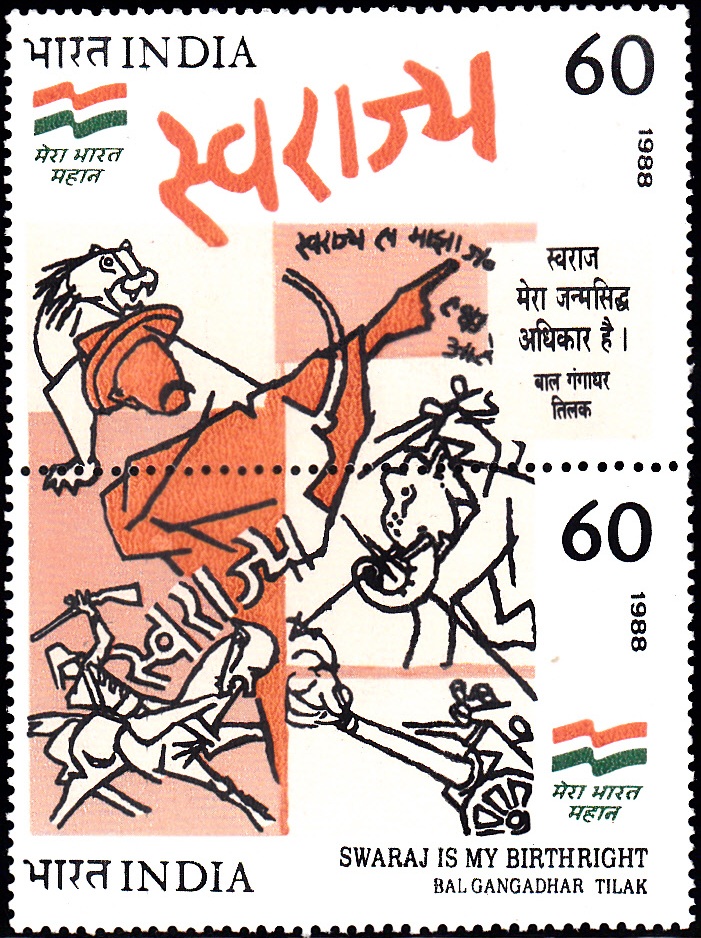
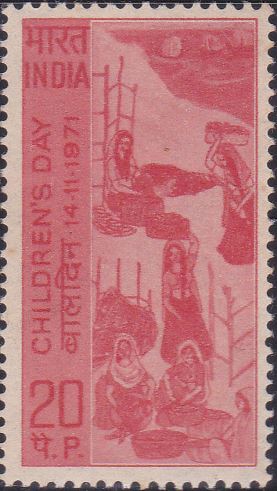

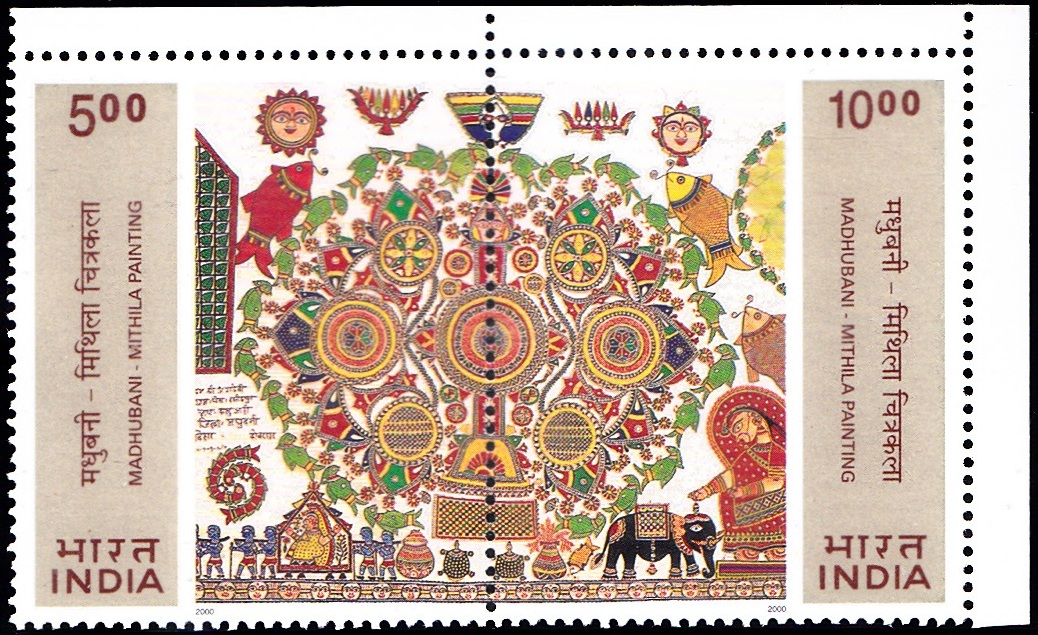
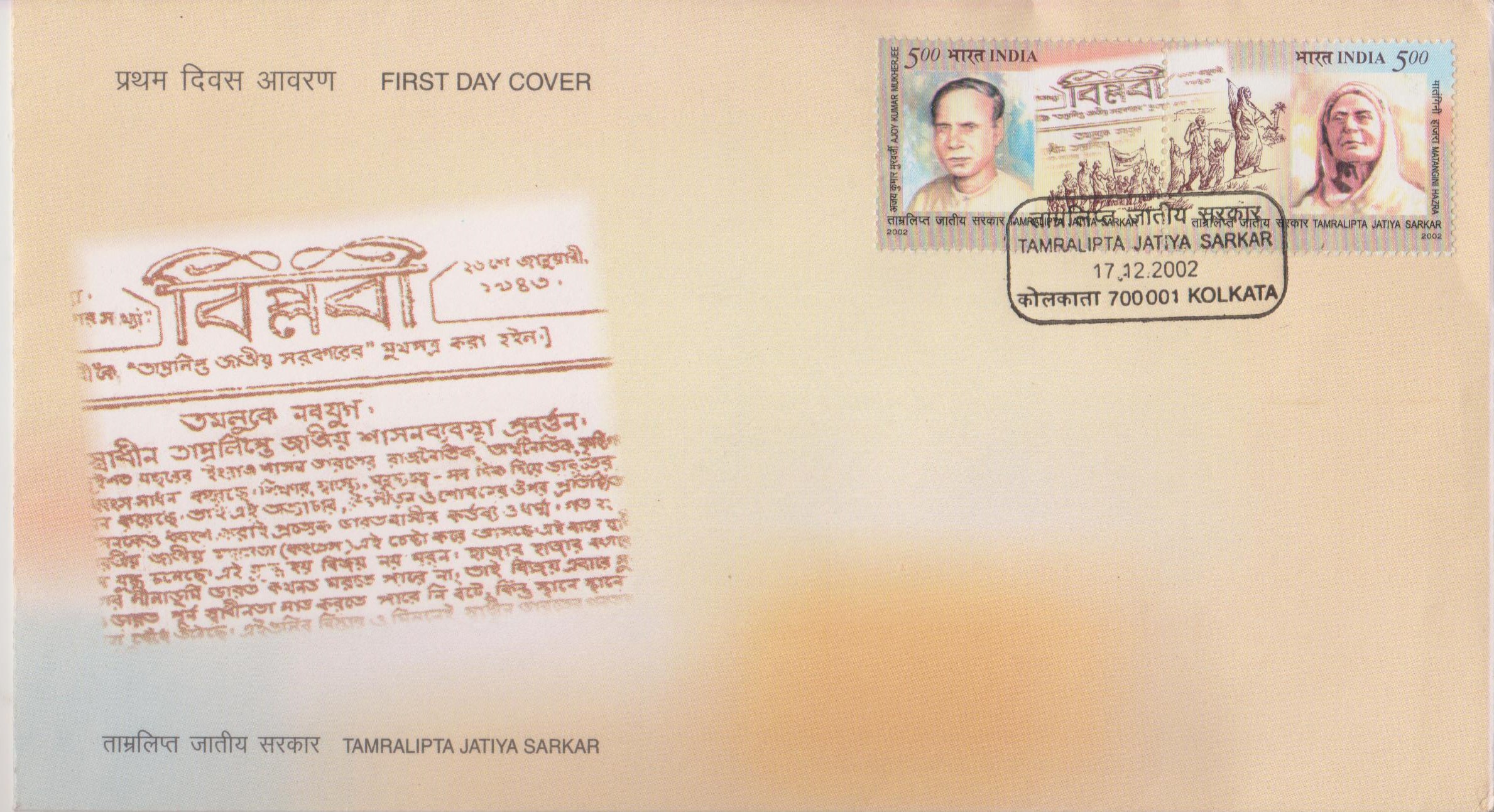
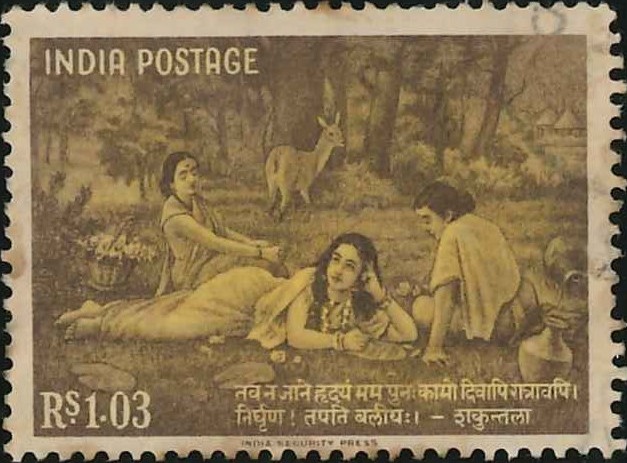
[…] 1857 War of Independence was fought with unique revolutionary fervour and sense of national identity. One of its many […]
[…] and culminated in the formal British annexation of the whole sub-continent after the abortive national uprising of 1857. Of the many turbulent epochs in the history of the sub-continent these years were perhaps […]
[…] struggle for independence started soon after the war of Independence (1857) and was led by Syed Ahmad Khan who served as a guiding force for the politically weak […]
[…] the royal capital. Following this, Haryana supported Delhi and remained in the background till the first struggle for freedom in 1857. When the British Empire was re-established after suppression of the revolt, the kingdoms […]
[…] story of the first Indian struggle for freedom of 1857 would not be complete without the mention of Veer Surendra Sai. Though the great revolt of 1857 […]
[…] of his followers, the idol of the masses and the dread of his opponents. Born one year before the Great Revolt of 1857, he was the most outstanding among the pioneers of India‘s freedom struggle, and one who did […]
[…] Azad, was born in Mecca in 1888 – where his ancestors had migrated from India during the revolt of 1857. Azad spent his childhood in Arabia, studying privately. In 1898 he accompanied his parents to […]
[…] Ramgarh State in central India, is remembered for her valiant fight against the British during the 1857 War of Independence, when she made the supreme sacrifice of her life for the freedom of […]
[…] revolt of 1857 was an important milestone in India’s struggle for independence, a glorious chapter in the […]
[…] First War of Independence (1857-58) was the first general widespread uprising against the rule of the British East India […]
[…] and worked there for a time with a firm. India was just then passing through the turmoil of the 1857 Revolution. A patriot at heart, Dadabhoy Naoroji decided to return home and enlist in the service of his […]
[…] Great Rising of 1857 changed the fortunes of many individuals and families, especially those associated with the […]
[…] many years after the first war of Independence, in 1857, armed resistance against the British was witnessed in many parts of the […]
[…] The gate faces towards Kashmir, so it was named Kashmere Gate under the British Raj. During the First War of Independence of 1857, the British had used the gate to prevent the rebels from entering the city. The left leaf […]
[…] Late Rao Birender Singh, a descendant of Shaheed-e-Azam Rao Tula Ram, a frontline hero of the 1857 movement for Independence, belonged to the Royal Family of Rewari. He was born on 20th February 1921 in […]
[…] first ‘Kotwal’ – Malik-ul-Umara Faqruddin appointed in 1237 AD. The aftermath of India’s first war for freedom in 1857 saw the then ruling Britishers frame the Indian Police Act of 1861 to firmly establish a […]
[…] to the Ujjainiya Rajput clan. He is known as one of the most important freedom fighters who led the Indian Rebellion of 1857 in Bihar. He was nearly eighty and in failing health when he was called upon to take up […]
[…] Charles Darwin arrived at Galapagos and forever changed the way we look at our evolution. India’s first war of independence in 1857, partition of Bengal in 1905, the two World Wars, strides in the field of […]